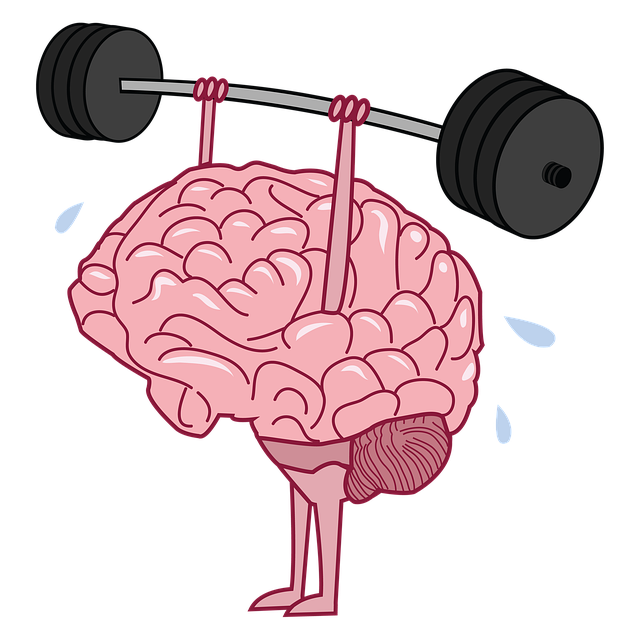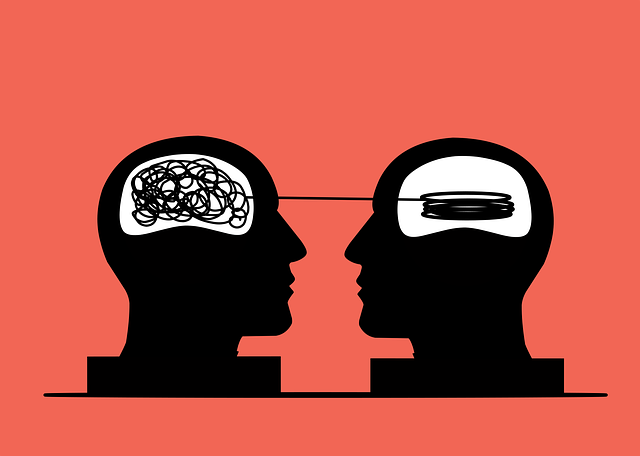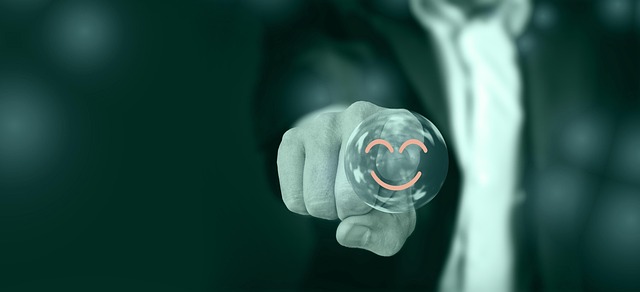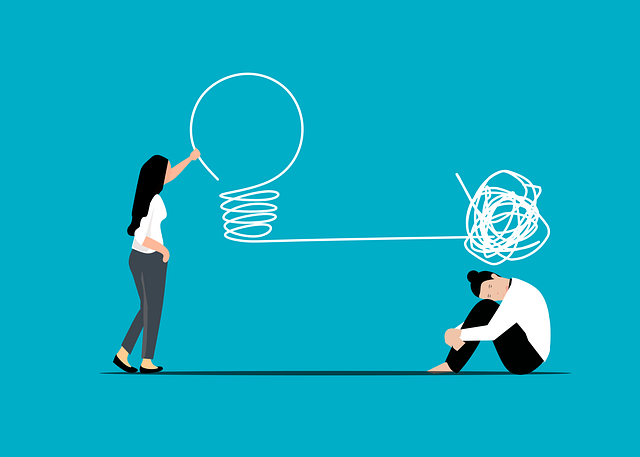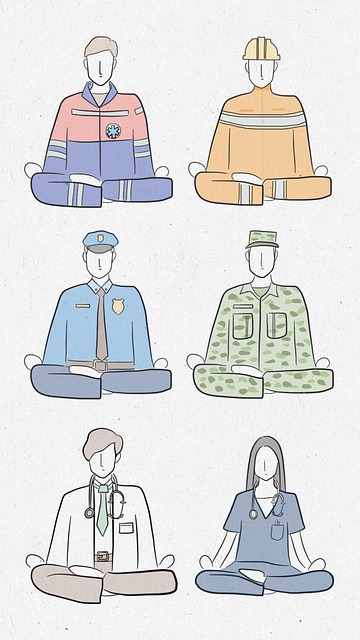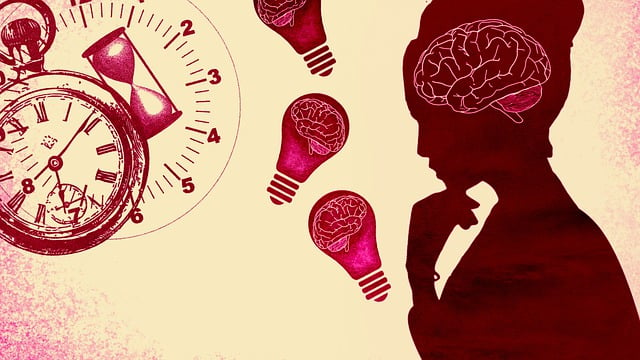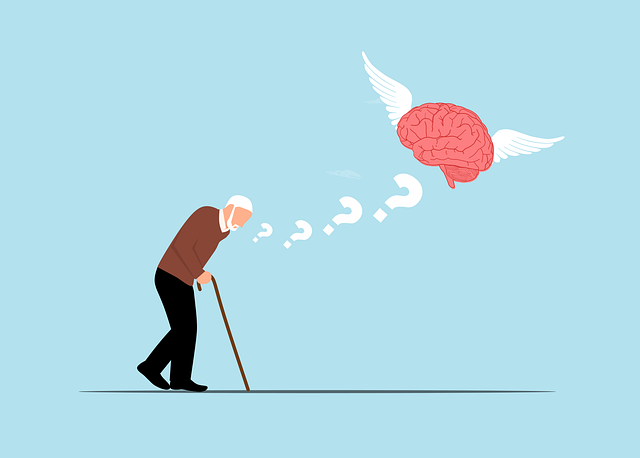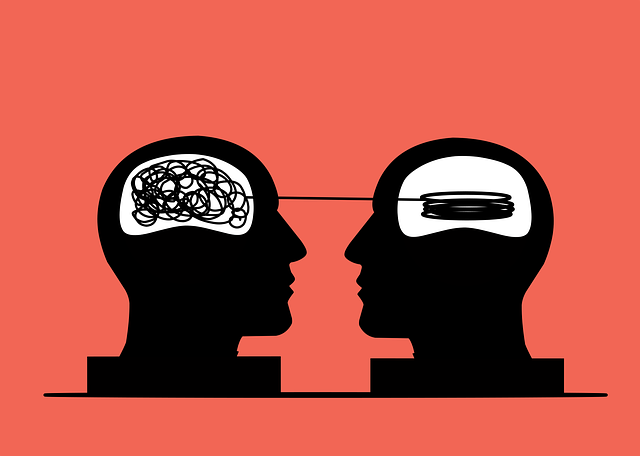Anxiety disorders, globally prevalent, require tailored understanding and management. Recognizing distinct types like GAD, panic disorder, and social anxiety is crucial, with hidden causes such as sexual addiction often overlooked but significant. Therapy for Adults with Sexual Addiction offers specialized support through introspection, self-care, cognitive-behavioral therapy (CBT), and community outreach programs, empowering individuals to develop personalized coping mechanisms. CBT focuses on thought patterns, emotions, and behaviors, helping reframe perspectives and adopt healthier strategies. Mindfulness and meditation practices, integrated into daily routines, enhance emotional well-being. Lifestyle changes, including balanced diets and regular exercise, significantly reduce symptoms. Seeking professional help, like tailored therapy for sexual addiction, is vital for recovery, addressing underlying causes and changing unhealthy thought patterns. Support groups and counseling services raise awareness, while mental health professionals offer specialized treatments for co-occurring disorders, fostering long-term recovery.
Anxiety disorders are prevalent, affecting millions worldwide, yet managing them effectively remains a challenge. This comprehensive guide explores various anxiety management techniques, offering practical strategies for those seeking relief. From understanding the common types and triggers of anxiety to delving into therapeutic approaches like Cognitive Behavioral Therapy (CBT) and mindfulness practices, this article equips readers with tools to combat symptoms. Additionally, it highlights lifestyle changes, including diet, exercise, and sleep routines, and emphasizes the importance of professional help, even for unique concerns such as adult sexual addiction, offering a holistic approach to anxiety management.
- Understanding Anxiety Disorders: Recognizing Common Types and Triggers
- Cognitive Behavioral Therapy (CBT): A Step-by-Step Guide for Overcoming Anxiety
- Mindfulness and Meditation Practices for Calming the Anxious Mind
- Lifestyle Changes to Reduce Anxiety: Diet, Exercise, and Sleep Routines
- Seeking Professional Help: Therapies and Support for Adult Sexual Addiction
Understanding Anxiety Disorders: Recognizing Common Types and Triggers

Anxiety disorders are a common mental health challenge, affecting millions worldwide. Understanding these conditions is a crucial step in managing them effectively. Recognizing specific types such as generalized anxiety disorder (GAD), panic disorder, and social anxiety disorder is essential as each has distinct characteristics and triggers. For instance, GAD is characterized by excessive worry and fear about various aspects of life, while panic disorder involves recurrent and unexpected panic attacks. Triggers can vary widely, from stressors related to work or finances to specific phobias or even traumatic experiences.
It’s also important to address the impact of hidden triggers like sexual addiction, which, though often overlooked, can significantly contribute to anxiety. Therapy for Adults with Sexual Addiction offers specialized support to confront and manage these issues. By identifying personal triggers through introspection and sometimes professional guidance, individuals can develop coping mechanisms tailored to their unique needs. This process involves a combination of self-care practices, cognitive-behavioral therapy, and community outreach program implementations designed to provide anxiety relief and enhance overall well-being.
Cognitive Behavioral Therapy (CBT): A Step-by-Step Guide for Overcoming Anxiety

Cognitive Behavioral Therapy (CBT) is a highly effective step-by-step guide for individuals seeking to overcome anxiety. This therapy focuses on identifying and challenging negative thought patterns that contribute to anxious feelings. By understanding how thoughts, emotions, and behaviors interact, CBT empowers individuals to reframe their perspectives and adopt healthier coping mechanisms. The process begins with tracking one’s thoughts and behaviors, recognizing triggers, and learning to challenge cognitive distortions like catastrophizing or all-or-nothing thinking.
Through structured sessions, clients learn self-care practices, including relaxation techniques and stress management workshops, which can help alleviate symptoms. Social skills training is another crucial component, teaching individuals how to navigate social situations with more confidence and less anxiety. CBT encourages active participation and homework assignments between sessions, fostering a sense of agency in managing one’s mental health. This tailored approach has proven beneficial for various forms of anxiety, even addressing therapy for adults with sexual addiction by helping them address underlying issues and develop healthier responses.
Mindfulness and Meditation Practices for Calming the Anxious Mind

Mindfulness and meditation practices have emerged as powerful tools for calming the anxious mind. By focusing on the present moment and cultivating a non-judgmental awareness, individuals can learn to observe their thoughts and feelings without getting swept away by them. This is particularly beneficial for those dealing with anxiety disorders, as it helps to break the cycle of worry and rumination.
Incorporating mindfulness into daily routines, such as mindful breathing exercises or body scans, can significantly enhance emotional well-being promotion techniques. These practices foster cultural sensitivity in mental healthcare by encouraging a deeper connection with oneself and one’s experiences, regardless of background. Empathy building strategies, too, are strengthened through mindfulness, allowing individuals to approach their anxious thoughts with compassion and understanding.
Lifestyle Changes to Reduce Anxiety: Diet, Exercise, and Sleep Routines

Anxiety management often involves making positive lifestyle changes, which can significantly reduce symptoms and improve overall well-being. One such change is adopting a balanced diet, as nutrition plays a crucial role in mental health. Incorporating foods rich in omega-3 fatty acids, vitamins B and D, and magnesium can help regulate mood and reduce anxiety levels. Additionally, staying hydrated and limiting caffeine intake can create a calmer mindset.
Regular exercise is another powerful tool to combat anxiety. Physical activity stimulates the release of endorphins, which act as natural stress and pain relievers. Whether it’s going for a walk, practicing yoga, or engaging in a favorite sport, consistent exercise routines can help individuals manage anxiety effectively. Moreover, establishing a structured sleep routine is vital; adequate rest promotes better mental clarity and emotional resilience. Combating the Mental Illness Stigma Reduction Efforts by prioritizing these lifestyle factors alongside professional therapy for adults with sexual addiction can lead to substantial Anxiety Relief and improved quality of life.
Seeking Professional Help: Therapies and Support for Adult Sexual Addiction

For many individuals struggling with adult sexual addiction, seeking professional help is a pivotal step in their journey towards recovery. Therapy offers a safe and structured environment to explore the underlying causes of this complex issue, which often involves a combination of psychological approaches tailored to the individual’s needs. Cognitive-Behavioral Therapy (CBT), for instance, has proven effective in helping individuals identify and change unhealthy thought patterns and behaviors related to sexual addiction.
Support groups and counseling services play a significant role in the public awareness campaigns development surrounding adult sexual addiction. These platforms provide peer-to-peer connections, fostering understanding and encouragement. Additionally, mental health professionals can conduct risk assessments to ensure appropriate care and consider specialized treatments, addressing not just the addiction but also any co-occurring disorders. Stress management workshops organized by such professionals can empower individuals with tools to cope with triggers and maintain long-term recovery.
Anxiety management is a multifaceted journey, encompassing understanding disorders, cognitive reframing through CBT, mindfulness practices, lifestyle adjustments, and seeking professional support. This comprehensive approach empowers individuals to navigate their anxious minds effectively. By recognizing triggers, adopting therapeutic techniques like CBT, integrating mindfulness, and making positive lifestyle changes, one can significantly reduce anxiety symptoms. Moreover, for those struggling with adult sexual addiction, specialized therapy offers a crucial path to recovery. Remember, managing anxiety is achievable through tailored strategies and the right support network.

